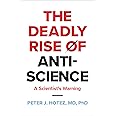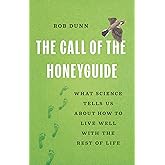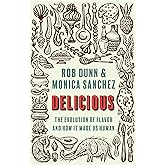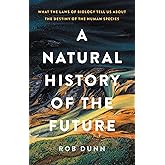
Download the free Kindle app and start reading Kindle books instantly on your smartphone, tablet or computer â no Kindle device required.
Read instantly on your browser with Kindle for Web.
Using your mobile phone camera, scan the code below and download the Kindle app.

Image Unavailable
Colour:
-

-
-
- To view this video, download


 Audible sample
Audible sample A Natural History of the Future: What the Laws of Biology Tell Us about the Destiny of the Human Species Paperback â Nov. 1 2022
ÂéķđĮø
Purchase options and add-ons
âAn arresting vision of this relentless natural worldâ (New York Times) by a leading ecologist, who urges us to heed natureâs iron lawsĖý
Our species has amassed unprecedented knowledge of nature, which we have tried to use to seize control of life and bend the planet to our will. InâŊ A Natural History of the Future, biologist Rob Dunn argues that such efforts are futile. We may see ourselves as lifeâs overlords, but we are instead at its mercy. In the evolution of antibiotic resistance, the power of natural selection to create biodiversity, and even the surprising life of the London Underground, Dunn finds laws of life that no human activity can annul. When we create artificial islands of crops, dump toxic waste, or build communities, we provide new materials for old laws to shape. Lifeâs future flourishing is not in question. Ours is.Ėý
As ambitious as Edward O. Wilsonâs Sociobiology and as timely as Elizabeth Kolbertâs The Sixth Extinction, A Natural History of the Future sets a new standard for understanding the diversity and destiny of life itself.Ėý
- Print length320 pages
- LanguageEnglish
- Publication dateNov. 1 2022
- Dimensions13.97 x 2.03 x 20.96 cm
- ISBN-101541603125
- ISBN-13978-1541603127
Explore your book, then jump right back to where you left off with Page Flip.
View high quality images that let you zoom in to take a closer look.
Enjoy features only possible in digital â start reading right away, carry your library with you, adjust the font, create shareable notes and highlights, and more.
Discover additional details about the events, people, and places in your book, with Wikipedia integration.
Frequently bought together

Popular titles by this author
Product description
Review
â[A] lucid discussion âĶDunnâs absorbing analysis advocates making the most of the few certainties we have.ââScientific American
âRob DunnĖýsteers our attention toward the biota under our noses as part of a broader project to explicate the circumstances that prompt new life forms, and adaptive behaviors, to appear . . . Ėýmake[s] glaringly clear that we are not in command of what we have set in motion. The biodiversity and versatility on display in the animal kingdom of which we are part have lots to teach us. To remain at home in the world, we too will need to change.â
ĖýâThe Atlantic
âEven if we could halt fossil fuel emissions tomorrow, we would still need to make some big changes. Evolutionary biologistĖýRob Dunnâs timely new book,ĖýA Natural History of the Future: What the Laws of Biology Tell Us About the Destiny of the Human Species,Ėýis a guide to this complex problem and offers palatable solutions. âĶ a clear and important read.âĖý
ĖýâMary Ellen Hannibal, Science
âThis is one of my favorite pop science books that Iâve read recentlyâĶ in addition to lucid explanations and interesting anecdotes, Dunn offers a message of hope.ââAmerican Biology Teacher
âA stimulating exploration into how the laws of biology can help us âunderstand the future into which we areâarms flailing, coal burning, and full speed aheadâhurling ourselves.âĖýâĶ Dealing reasonably with the circumstances requires knowledge and imagination. The author avoids the usual implausible how-to-fix-it conclusionâĶ Instead, he offers a book that is less doomsday prophecy and more excellent primer on ecology and evolution.ĖýAn imaginative, sensible education for those concerned with the fate of the Earth.â
âKirkus"[Dunn argues] people can help mitigate the effects of climate change by valuing âthe rest of lifeâ outside humanity, as well as heeding the lessons that other life has to teach. Thoughtful and accessible, this deserves a wide readership."âPublishers Weekly
âIn forecasting future ecology, Dunn enlists biological laws to predict what likely lies ahead for life on our planet, including usâĶ Dunn engagingly explains biogeography, inventive intelligence, and speedy evolutionary reaction to changing conditions.âĖýâTony Miksanek, Booklist
âA fascinating, shocking, and inspiring guide to the future by one of the most creative and eloquent biologists of our time. Dunnâs book is packed full of insight from the latest scientific discoveries about the wonders and troubles of the living Earth.â
ĖýâDavid George Haskell, author of The Forest Unseen
âSpeciations in weird urban habitats, viruses chasing hosts around the globe, and the greatest challenge life on Earth has faced for two million years: this is the fascinating and sobering ecology of the Anthropocene.â
ĖýâRebecca Wragg Sykes, author of Kindred
âA timely, thought-provoking analysis, delivered in the affable prose that has become Dunnâs hallmark.ââThor Hanson, author of Hurricane Lizards and Plastic Squid
About the Author
Ėý
Product details
- Publisher : Basic Books
- Publication date : Nov. 1 2022
- Language : English
- Print length : 320 pages
- ISBN-10 : 1541603125
- ISBN-13 : 978-1541603127
- Item weight : 295 g
- Dimensions : 13.97 x 2.03 x 20.96 cm
- ÂéķđĮø Rank: #638,677 in Books (See Top 100 in Books)
- #345 in Ecology (Books)
- #402 in Ecology in Earth Science
- #506 in Human Geography (Books)
- Customer Reviews:
About the author

Rob Dunn is the author of eight books dealing, variously, with the the unknown world, the life on human bodies, the evolution and study of human hearts, the threats to our crops, the biodiversity in homes, the evolution of flavor, the future of life and, most recently, human mutualisms with other species.
Dunn is an ecologist and evolutionary biologist by training, with interests that spill over into nearly everything. He is a Reynolds Professor in the Department of Applied Ecology at NC State University. He also serves as the Senior Vice Provost for University Interdisciplinary Programs.
Dunn began his career studying ants and the species that live with ants. Over time, he came to also study humans and the species that live with humans. This work has led him to the far reaches into the Bolivian ÂéķđĮø and, also, into the deep recesses of human belly buttons. His current research considers the evolution of ant societies, the ecology of sourdough bread, the use of yeasts from wasps in making new kinds of beers and the value of trees to cities.











